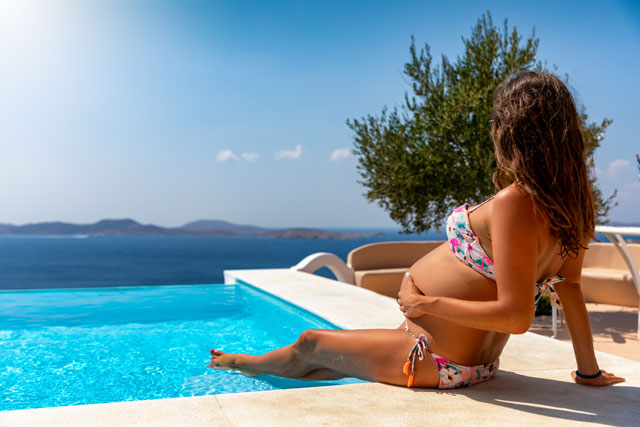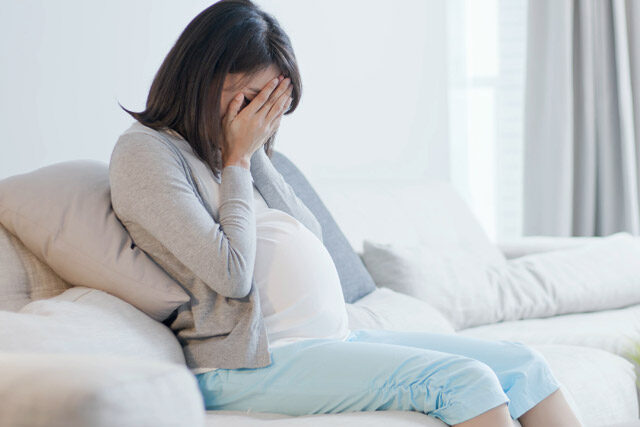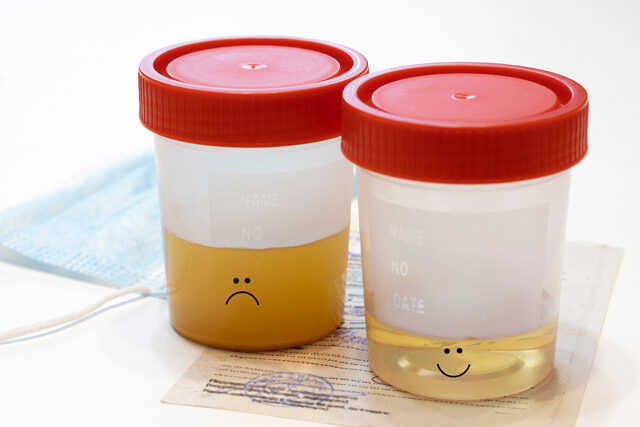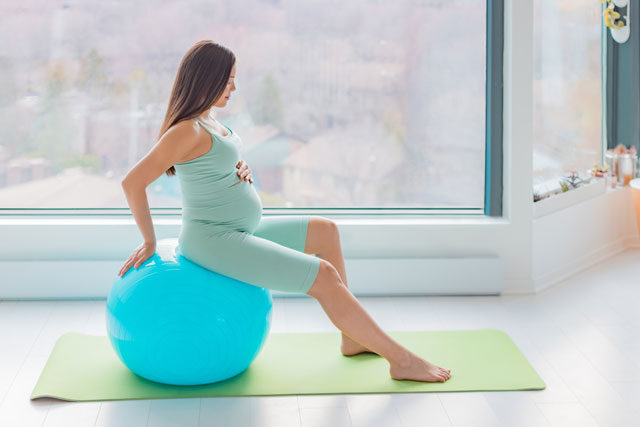The future mother has to rethink many of her habits and preferable activities as many of them can affect her baby. One such thing that is surrounded by misconceptions, is tanning during pregnancy.
Skin Protection
Ultraviolet rays that go through the ozone layer are of A and B types, different in wavelength. UV-B rays make up almost 5% of the UV radiation that can reach us. They are what causes sunburns and are most associated with skin cancer. UV-A rays are also called “tanning rays”. Having the longest wavelength, they penetrate the skin most deeply causing its darkening which is actually known as a tan.
Note that skin injuries caused by UV radiation have DNA origin and are not only permanent but also cumulative. This means the damage starts with the very first tan and does not ever heal, and every exposure adds to premature aging and increases the chances of developing skin cancer. The majority of non-melanoma skin cancers (NMSC) and a significant portion of melanomas are linked to UV radiation from natural sunshine and/or indoor tanning. This explains the great importance of skin protection for your health.
Sunbed
A tanning bed is a device that emits ultraviolet radiation to imitate the effects of the sun and, thus, create a tan. Some new models are marketed as safer because they produce only UV-A rays, but, in fact, UV-A emission possesses an even greater risk of premature aging and skin cancer because they penetrate the deeper levels of it. The WHO classifies sunbeds as one of the most serious categories of cancer-causing products, close to cigarettes. Studies show that a significant percentage of women diagnosed with melanoma before 30 were using tanning beds.
The commonly searched question is if tanning beds are safe during pregnancy. There is no direct evidence that indoor tanning creates a direct risk for the baby except for overheating of the mother but, due to cancer endangerment, it would be a good idea to completely stop using tanning beds during pregnancy.
Beach
If you want to spend some time at the beach while pregnant, there is nothing wrong with it. Fresh air and moderate physical activity are quite beneficial for the good health of the future mother and her child. Just remember to practice sun safety:
- Cover your skin as much as you can. Clothes and being in the shade are the best way to protect yourself against sun radiation.
- Use sunscreen products. Use those with a sun protection factor that is at least 50 because it can balance out common mistakes that people do when applying products. As skin often gets more sensitive during pregnancy, remember to do an allergy test before full-body use of the products and try to get a sunscreen that provides physical protection, not chemical, and contains zinc oxide or titanium dioxide. It is less likely to cause an unwanted reaction.
- Avoid being outdoors when the sun is the most active. The sun’s intensity peaks between 10 AM and 4 PM, so try to stay at home at these hours. Early mornings and evenings are still warm enough to get a pleasant time, but much safer for you in terms of the skin effects or chances of overheating and dehydration.
Sprays
Self-tanner, or a fake tan, is a cosmetic product that gives its user a tanned appearance without them actually being in the sun and exposing themselves to sun radiation. The main ingredient of those is non-toxic dihydroxyacetone (DHA) which interacts with the cells of the epidermis (top skin layer) and results in the production of a dark pigment called melanoidin.
Is tanning lotion safe during pregnancy? DHA will not be absorbed into the body as it does not go beyond the outer layer of the skin, so it can’t harm the baby. However, there is no evidence regarding the consequences of accidental swallowing or inhaling the spray tan particles so try to avoid products in the form of aerosol when pregnant. Also, you should remember about individual sensitivity and try the product on the small area of your skin, for example, the inner elbow bend, before using.
How to stay safe while pregnant and tanning
If you want to reduce risks to a minimum, a fake tan is your best bet on how to get tan while pregnant. Healthcare providers generally do not recommend UV tanning when you are with child, though being outdoors if complying with sun safety rules is perfectly fine.
Tanning during pregnancy risks
Without taking into account skin damage which is unrelated to pregnancy, here are some reasons why tanning in the sun or a sunbed is unsafe for mothers-to-be:
- Some studies link UV radiation and folate destruction. Folates are folic acid compounds and folic acid is very important for the proper development of the baby’s spine and neural system. It happens at the early stages of pregnancy, which is why tanning while pregnant in the first trimester carries an additional risk of birth defects.
- Overheating and dehydration. These two factors usually go together, as the body loses more water when being in excessive heat. They are especially dangerous for women who try tanning while pregnant in the second and third trimesters, because they can lead to serious complications, including low amniotic fluid or even premature birth.
Summary
While there are no studies that indicate that tanning is particularly harmful to a pregnant woman or her baby, there are risks connected to being exposed to solar radiation and being in the heat. This means that the best way to spend time outdoors in sunny weather is at safe hours, properly dressed, shaded, and with sunscreen. And if you want to get tanned skin safely, use a fake tan lotion.
FAQ
How long can I tan in the sun while pregnant?
Tanning is unadvisable during pregnancy because UV radiation and heat create the risk of skin irritations, sunburns, overheating, and dehydration.
Is it safe to use fake tan during pregnancy?
The main component of fake tan products (DHA) does not absorb into your bloodstream and cannot reach the baby unless not swallowed or inhaled. This means you can use fake tan cosmetics, but lotions are preferable to sprays.
When should you stop tanning if you’re pregnant?
UV tanning carries different risks at different pregnancy stages, so it is best to avoid tanning completely while pregnant.
Why are tanning beds bad during pregnancy?
Tanning beds are considered one of the main cancer risk factors. They also put your body into much heat which can easily lead to heat stroke and/or dehydration.




